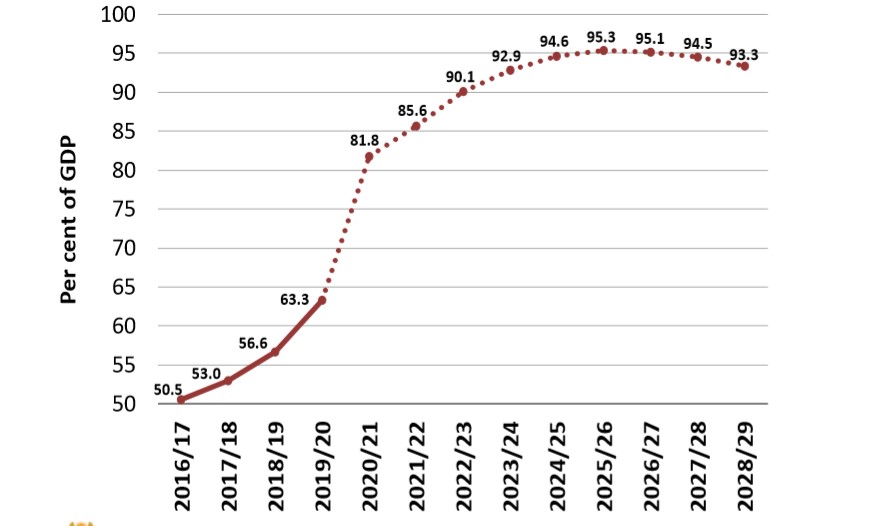Back in February, Finance Minister Tito Mboweni set the crucial debt-to-GDP target to peak in three years. It was inevitable that yesterday’s Medium Term Budget Policy Statement (MTBPS) would be judged by the markets on its adherence to this.
The MTBPS failed miserably on this score, and, with that, showed that budget cuts to control debt are very probably a political impossibility under the African National Congress (ANC).
Yesterday was yet another episode of decisions and targets delayed, with yet more promises being made. Back in February, the commitment was for debt to peak at 87.4 percent of GDP in the 2023/24 fiscal year. Yesterday, the plan was for debt-to-GDP to peak at 95 percent of GDP by 2025/26. So the goal will have been missed and a new and larger one set for two years later.

With the debt goal set back in February now anticipated to be missed, the Rand took a hit of nearly two percent and South Africa’s government bond prices fell and their yields rose. Given its current spending trajectory and debt burden, the country could be increasingly reliant on market access just to service its debt. In the event of sudden international risk aversion, it is a dangerous place to sit.
There was no offsetting positive news about South Africa’s fiscal future yesterday. The Treasury expects the economy to contract by nearly 7.8 percent this year and for tax revenue to be R312bn below what was predicted back in February, and it is expected over the next two years to remain way under what was expected.
No done deal
Civil servant pay will take up an estimated 32.7 percent of total spending this fiscal year. The proposed wage freeze over three years in the MTBPS will only reduce pay as a share of spending to 31.3 percent of spending. There is no done deal yet on public service pay and there are no signs of progress, and the unions remain outraged.
The average civil servant has enjoyed pay rises of 40 percent over the past 10 years and earns R400 000 a year, which is well in excess of the average pay in the private sector.
Mboweni said yesterday that the Treasury is asking for pay reductions at senior levels in government and at state-owned enterprises.While hundreds of thousands of jobs have been lost in the private sector due to lockdown lay-offs, none have been lost in the public sector.
Without adequate control of remuneration, there will be no doubt that the ANC does not have the resolve to ensure fiscal consolidation. Yet, with about 1.3 million civil servants making up the backbone of union strength today, the labour movement will have to give a robust fight to retain its past gains. Taking on the unions on pay would represent a sea change in the government’s stance toward organised labour.
Government is still intent on saving failing state enterprises with public funds and is prepared to cut allocations to the police, universities, schools, and hospitals to pay for a flag carrier. It is probably poltically impossible to cut more from these sources to pay for glamour projects. SAA was granted R10.5bn for business rescue purposes, the minister stressed. The R10.5bn for SAA was a sign that the Treasury had lost the battle on the entire matter of bailouts to state-owned enterprises.
Failure to meet the debt-to-GDP ratio goal would prove the rating agencies correct in their judgement that South African reform and fiscal consolidation lacks political support and is, by implication, politically impossible. Last year the credit rating agency Moody’s said ‘resistance to reforms from key stakeholders limits the government’s room to adopt and implement structural reforms’.
Politically impossible
Deep cuts in spending might indeed be politically impossible. Social spending, made up of education, health, community development, and social development (which includes grants of various types), makes up about 58 percent of total expenditure in the February budget. The big categories in this spending – such as basic education, hospital services, transfers to municipalities, and various grants – are off limits to deep cuts. Then add in debt service costs, the fastest growing category of spending, upon which there is absolutely no discretion to cut, and the difficult-to-cut share rises to 70 percent.
These figures include pay to civil servants, but remuneration is more likely to see freezes or slow increases than actual cuts. And lay-offs or a freeze in hiring are not yet on the agenda.
There was also the promise to use zero-based budgeting at the time of the June emergency budget. Under this budgeting technique, allocations are made afresh each year on the merits of a department’s spending plans. In his speech yesterday, Mboweni signalled that this will only see a very gradual introduction. As a first step, zero-based budgeting is only being introduced into the Treasury and the Department of Public Enterprises.
With the economy highly constrained, new income taxes, such as solidarity taxes on the rich, a higher marginal tax rate, and higher estate duty, would yield little in extra revenue. A higher VAT rate would yield the most revenue, but would spark political outrage. Come February next year, the minister will very probably have to impose new taxes as a symbolic gesture to demonstrate that the pain is being shared.
May not be forthcoming
A R1bn loan from the New Development Bank set up by the BRICS is in the offing, but World Bank money may not be forthcoming as the Bank does not want to see this contribute to pay for civil servants or the SAA bailout. The search will be on for additional domestic sources.
The trajectories into a debt trap never end well, but do end in a similar way, says Efficient Group economist Dawie Roodt. The course is on for prescribed assets and the imposition of stricter foreign exchange controls to make it easier for government to draw on domestic to savings to make up shortfalls. Nationalisation of the Reserve Bank would make it easier to grab foreign exchange reserves and compel the central bank to monetise the deficit.
South Africa will have to prove from now on that it is not on that course, if it is to have an improved future.
Mboweni’s invocation in his speech yesterday of the biblical wisdom from John, Chapter 12, verse 35, was eloquent and pertinent. ‘Walk while you have the light,’ it reads, ‘before darkness overtakes you. Whoever walks in the dark does not know where they are going.’
He has given these dire warnings before, yet the necessary decisions have not followed.
[Picture: 3402744 from Pixabay]
The views of the writer are not necessarily the views of the Daily Friend or the IRR
If you like what you have just read, support the Daily Friend

